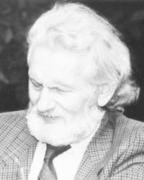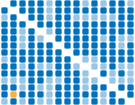The page of Kadlečík, Ivan, English Reception
Reception
CHARACTERISTICS OF HIS WORKIvan Kadlečik entered Slovak literature as a critic and editor of the literary magazines Krok and Matičné čítanie. As a result of extraliterary circumstances, however, his first book, From Sermons on the Plains, a selection of his literary criticism, was banned before publication and officially appeared only twenty-two years later. The powers of ‘normalization’ after the invasion of Czechoslovakia in 1968 considered Kadlečik as persona non grata and tried to drive him outside culture and society and, together with other authors inconvenient for the communist regime, to marginalize him, imposing upon hire complete silence. Kadlečik reacted to this external pressure by searching more deeply for his roots in history, in the generations of his ancestors, in nature and culture; he moved away from critical reflection and rather than literary works, the central point of his interest became his own destiny. For Kadlečik, autobiographical motifs and the stressing of authenticity belong to the most important moments of the creative process. In the Seventies and Eighties the genres he wrote in expanded to the feuilleton and ‘discourses’; the latter were at that time popular especially in the Czech dissident community, being published in samizdat, to which Kadlečik regularly contributed as an author. The long lasting correspondence between proscribed writers developed into another literary genre - epistolary literature - and these were the origins of the book Poco Rubato, a collection of the correspondence between Kadlečik and the Czech dissident Ludvík Vaculík. In the Seventies Kadlečik turned completely towards more personal genres (autobiography, epistolary literature, essays). The first of his works manifesting this is the book Rhapsodies and Miniatures, whose characteristic feature is its autobiographical quality. His literary space is staked out by the themes of Protestantism, home, a close relationship with nature and to all the animate and inanimate things. Nature for him means ‘the circulation of life, the kinship all living beings, the feeling of identity’ (V. Petrík). A special motif in Kadlečik’s work is that of music, which subsumes also previous motives (faith, nature...) In his book, Last Year Like Today, he devoted a special chapter to music where it becomes a part of his pantheistic understanding of natural processes. Kadlečik’s search for, and adherence to, tradition and national roots resulted in a book of literary portraits of the important personalities of Slovak history, Faces and Addresses. A bridge between the period of normalization and the Nineties is formed by Epistles, containing mainly correspondence from the Nineties and diary entries of an older date. In Epistles as in One’s Own Horrorscope he openly discusses the contemporary political situation. In terms of genre we find two exceptional works in his production in the Nineties - a work of prose, Tarot, and the collection of poetry The Heart is Called ň. So far his latest work is a bibliophile publication called Little Preludes, which he published at his own cost in an edition of twenty copies ‘as an expression of a spiritually free literary game’.
ON THE AUTHOR
Ivan Kadlečik never stooped to “settling the accounts” openly and critically in his texts with the (communist) regime, which had so dramatically changed his life and tried ‘expel’ him forever from society. His stubbornness and resistance (and maybe also contempt) were uttered at different levels. Above all, he stressed his own roots in Slovak life, in Slovak history; in Slovak culture. (Vladimír Petrík)
If we want to write about Kadlečik’s work, we must simultaneously write about music, philosophy, literature or politics. All this and many other elements are contained in his book Little Preludes, consisting of 46 freely connected texts. The author here reacts with exceptional sensitivity to everything that is brought by a new day, dawn, memory. His interest is attracted equally by a dream or the situation in literature, which nobody reads, but everybody writes. Kadlečik signifies exactly, but is not given to useless analyses. His free, occasionally diary-like narration is a lively and life-giving apprehension of interrelationships. (Andy Turan)
THE AUTHOR ON HIMSELF
I consider myself as the link in a chain of generations of wanderers. Yes, I consider myself as a wanderer, who looks back on his way, ahead and around, too, like my ancestors, yeomen. teachers and priests, who never sat too long in one cosy place. I carry my home along, inside a little knotted handkerchief (of language, memory), so we should not lose our way too often.I feel I am the right hand of my ancestors, through them I pinpoint my identity and integrity, I am the executor of their will and of what they could not finish because of shortness of time and lack of strength; I am the executor of their testament. their covenant, and - paradoxically - this slavish obedience gives me freedom in the midst of vanity of deceitful moments.
AWARDS
Prize of Dominik Tatarka (1995)




